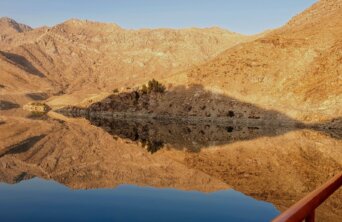- About
- Topics
- Picks
- Audio
- Story
- In-Depth
- Opinion
- News
- Donate
- Signup for our newsletterOur Editors' Best Picks.Send
Read, Debate: Engage.
| topic: | Climate Change |
|---|---|
| located: | Afghanistan, Iran |
| editor: | Shadi Khan Saif |
Iran and Afghanistan are currently in a dispute over water rights as climate change and poor governance exacerbate existing tensions. Iran has issued multiple demands and stern warnings to Afghanistan to prevent the storage of water in newly built dams, while Afghanistan cites the Helmand Water Treaty for its right to use the water for domestic needs. This disagreement has led to several border skirmishes, affecting vulnerable Afghan refugees in Iran.
Afghanistan has been experiencing drought-like conditions for years, with city dwellers struggling to find clean drinking water and rural communities unable to supply water to farms. The Kamal Khan and India-Afghanistan Friendship Dams are two of the few significant water management projects completed in the past half century.
Under the Helmand River Treaty of 1973, Afghanistan is required to deliver 22 cubic meters of water per second per annum to Iran, with an additional four cubic meters per second for “goodwill and brotherly relations.” However, Article V stipulates that Afghanistan retains full rights to the remaining water supply, which it can use or dispose of as it chooses.
Both Kabul and Tehran need to work together to find a solution to the water rights dispute, rather than resorting to aggressive rhetoric and force. Iran, as a larger economy and more stable government, can help Afghanistan manage its water resources by implementing modern agriculture methods and conservation techniques. Research into crops requiring less water and farming methods for conservation could make a significant difference.
Instead of a zero-sum game, the two countries could join forces in requesting a fair share of the Green Climate Fund to support water conservation and climate change mitigation. By adopting a collaborative approach, Iran and Afghanistan could find a mutually beneficial solution to their water rights dispute that benefits both countries and their populations.
Image by Abdul Wali Totakhail
